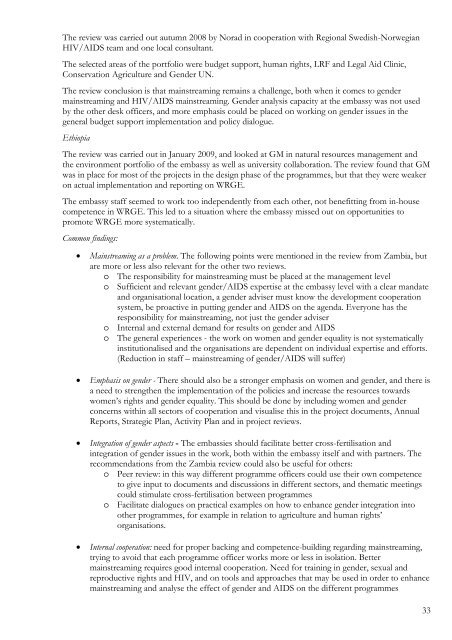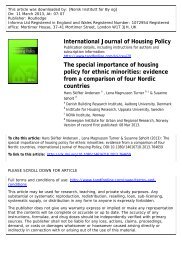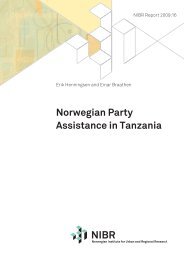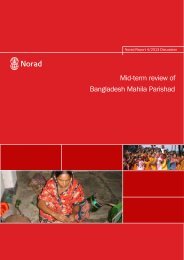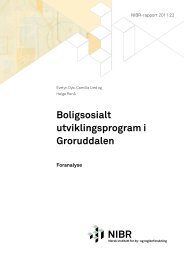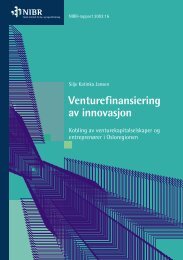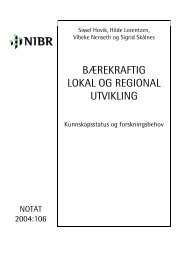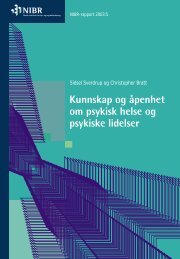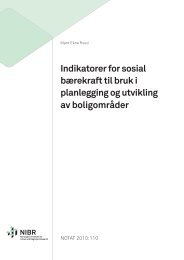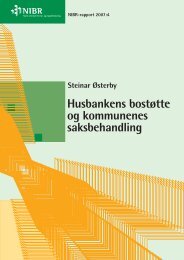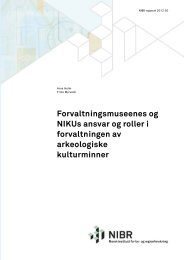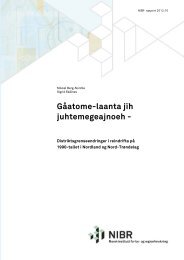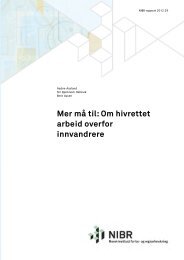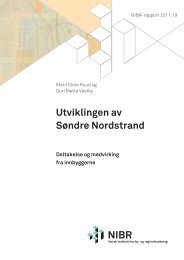Mid-Term Review of the Norwegian Action Plan for Women's ... - Norad
Mid-Term Review of the Norwegian Action Plan for Women's ... - Norad
Mid-Term Review of the Norwegian Action Plan for Women's ... - Norad
You also want an ePaper? Increase the reach of your titles
YUMPU automatically turns print PDFs into web optimized ePapers that Google loves.
The review was carried out autumn 2008 by <strong>Norad</strong> in cooperation with Regional Swedish-<strong>Norwegian</strong>HIV/AIDS team and one local consultant.The selected areas <strong>of</strong> <strong>the</strong> portfolio were budget support, human rights, LRF and Legal Aid Clinic,Conservation Agriculture and Gender UN.The review conclusion is that mainstreaming remains a challenge, both when it comes to gendermainstreaming and HIV/AIDS mainstreaming. Gender analysis capacity at <strong>the</strong> embassy was not usedby <strong>the</strong> o<strong>the</strong>r desk <strong>of</strong>ficers, and more emphasis could be placed on working on gender issues in <strong>the</strong>general budget support implementation and policy dialogue.EthiopiaThe review was carried out in January 2009, and looked at GM in natural resources management and<strong>the</strong> environment portfolio <strong>of</strong> <strong>the</strong> embassy as well as university collaboration. The review found that GMwas in place <strong>for</strong> most <strong>of</strong> <strong>the</strong> projects in <strong>the</strong> design phase <strong>of</strong> <strong>the</strong> programmes, but that <strong>the</strong>y were weakeron actual implementation and reporting on WRGE.The embassy staff seemed to work too independently from each o<strong>the</strong>r, not benefitting from in-housecompetence in WRGE. This led to a situation where <strong>the</strong> embassy missed out on opportunities topromote WRGE more systematically.Common findings:Mainstreaming as a problem. The following points were mentioned in <strong>the</strong> review from Zambia, butare more or less also relevant <strong>for</strong> <strong>the</strong> o<strong>the</strong>r two reviews.o The responsibility <strong>for</strong> mainstreaming must be placed at <strong>the</strong> management levelo Sufficient and relevant gender/AIDS expertise at <strong>the</strong> embassy level with a clear mandateand organisational location, a gender adviser must know <strong>the</strong> development cooperationsystem, be proactive in putting gender and AIDS on <strong>the</strong> agenda. Everyone has <strong>the</strong>responsibility <strong>for</strong> mainstreaming, not just <strong>the</strong> gender advisero Internal and external demand <strong>for</strong> results on gender and AIDSo The general experiences - <strong>the</strong> work on women and gender equality is not systematicallyinstitutionalised and <strong>the</strong> organisations are dependent on individual expertise and ef<strong>for</strong>ts.(Reduction in staff – mainstreaming <strong>of</strong> gender/AIDS will suffer)Emphasis on gender - There should also be a stronger emphasis on women and gender, and <strong>the</strong>re isa need to streng<strong>the</strong>n <strong>the</strong> implementation <strong>of</strong> <strong>the</strong> policies and increase <strong>the</strong> resources towardswomen’s rights and gender equality. This should be done by including women and genderconcerns within all sectors <strong>of</strong> cooperation and visualise this in <strong>the</strong> project documents, AnnualReports, Strategic <strong>Plan</strong>, Activity <strong>Plan</strong> and in project reviews.Integration <strong>of</strong> gender aspects - The embassies should facilitate better cross-fertilisation andintegration <strong>of</strong> gender issues in <strong>the</strong> work, both within <strong>the</strong> embassy itself and with partners. Therecommendations from <strong>the</strong> Zambia review could also be useful <strong>for</strong> o<strong>the</strong>rs:o Peer review: in this way different programme <strong>of</strong>ficers could use <strong>the</strong>ir own competenceto give input to documents and discussions in different sectors, and <strong>the</strong>matic meetingscould stimulate cross-fertilisation between programmeso Facilitate dialogues on practical examples on how to enhance gender integration intoo<strong>the</strong>r programmes, <strong>for</strong> example in relation to agriculture and human rights’organisations.Internal cooperation: need <strong>for</strong> proper backing and competence-building regarding mainstreaming,trying to avoid that each programme <strong>of</strong>ficer works more or less in isolation. Bettermainstreaming requires good internal cooperation. Need <strong>for</strong> training in gender, sexual andreproductive rights and HIV, and on tools and approaches that may be used in order to enhancemainstreaming and analyse <strong>the</strong> effect <strong>of</strong> gender and AIDS on <strong>the</strong> different programmes33


